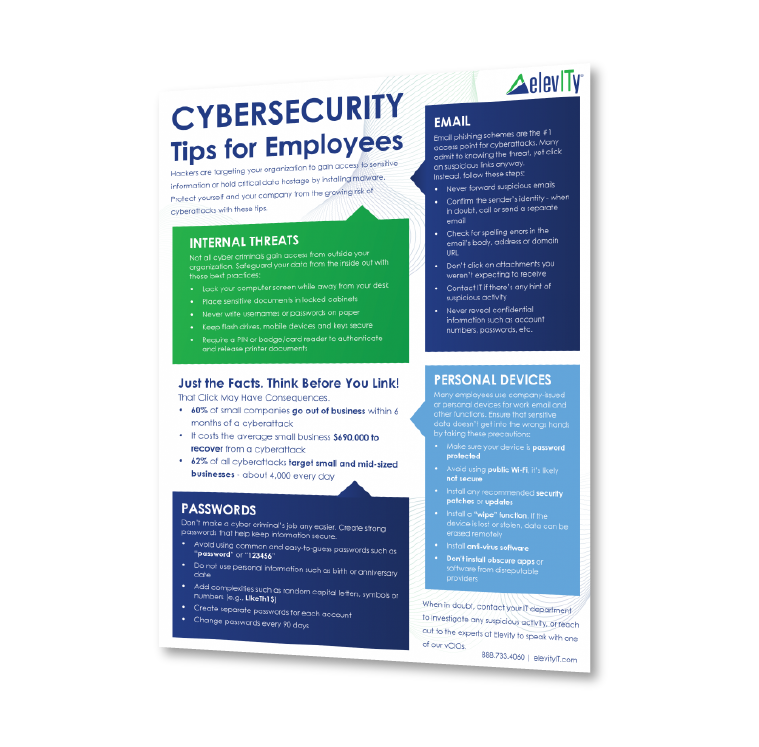Data breaches affect thousands of businesses, millions of people and expose billions of records, each year. In fact, a data breach or cyberattack occurs every 11 seconds.
Technology has become an integral part of our lives – both in the workplace and at home. In fact, more businesses than ever before have remote or hybrid employees. And many of these businesses have implemented a BYOD policy instead of assigning computer equipment to employees.
Trends such as these are reasons why data security and regulation compliance are more important than ever before in today’s business world.
Related: The Importance of Identity Verification for Help Desks
Will a Cyberattacker Target my Business?
Many industries have set their own standards and regulations designed to better safeguard data. In addition, businesses need to monitor their networks 24/7 as an attack could occur at any time.
Small businesses, in particular, often mistakenly assume that they will not be targeted by a hacker. But here are some sobering statistics we’d like to share:
- 43% of data breaches occur at small businesses.
- 60% of small businesses go out of business within six months after a cyberattack.
- 18% of cybersecurity threats on small businesses are malware.
- 51% of small business owners choose to pay when infected by ransomware.
- 88% of small business owners feel they are vulnerable to an attack.
With a bit of strategy, your IT Support team (or a trusted managed IT services provider) can form a comprehensive plan to ensure your systems are compliant and your data is kept secure.
Related: Best Cybersecurity Practices for Financial Institutions
What Is IT Compliance?
IT compliance is the set of laws, regulations, and standards that a business follows in order to safeguard their data through a comprehensive cybersecurity and monitoring infrastructure. The nature or industry of a business will typically dictate the standards and best practices that they will follow.
Rules for IT compliance are very strict and businesses who do not follow them risk large fines or worse.
What Is Data Security?
Data security is typically represented by enacting best practices that a business follows to secure their IT systems. This covers all areas of data security, including architecture, infrastructure management, cybersecurity, testing and information security.
Why are IT Compliance and Data Security Important?
IT compliance and data security matter as they are often the best chances a business has to keep their data secure and out of the hands of threat actors. They are essential for all businesses and are key to keeping both company and customer data safe.
Occasionally, you may hear about a major cybersecurity breach on the news. But breaches are unfortunately much more common than you realize. Most are not public knowledge and can happen in businesses of any size – including small businesses.
That’s why the U.S. has compliance laws and regulations designed for high-risk industries.
U.S. Compliance Laws and Regulations
Businesses should follow compliance standards designed for their industry. Here is a short list of some of the most common U.S. compliance standards:
- Health Insurance Portability and Accountability Act (HIPAA) is a law in the U.S. that oversees how healthcare data is protected and how/when it is shared.
- System and Organizational Controls (SOC2) is designed for companies maintaining digital customer data.
- Sarbanes-Oxley Act of 2002 (SOX) applies to U.S. financial-related institutions and provides guidelines for electronic records, data protection, internal reporting, and executive accountability.
- Payment Card Industry Data Security Standard (PCI-DSS) is administered by the Payment Card Industry Security Standards Council and is for businesses who handle credit card data and payments.
Check with the trade association in your industry for more information on compliance laws and regulations that your organization must follow.
How IT Support Ensures Compliance With Regulatory Requirements
First things first, a compliance officer for the organization should be appointed. Oftentimes, this is the highest-ranking IT employee or the person in charge of the IT department.
Next, your compliance officer should conduct a security assessment to identify which processes, procedures and software are in place and where there may be gaps that could be transformed into opportunities for improvement.
Afterwards, this assessment will be used along with any necessary compliance guidelines to construct a roadmap that will better assist your IT Support in safeguarding your organizational data and ensuring compliance with regulatory requirements.
An experienced managed IT services provider can also conduct this assessment and construct a roadmap for you.
How IT Support Ensures Organizational Compliance for Data Security
As modern cyberattacks have become more and more sophisticated, the tools that security analysts and officers use have become more complex too. Today, security professionals need to have a complete kit of tools to battle against malicious outside threats.
Elevity’s Approach to Technology Management
Elevity’s experts in data security and compliance are here for you. Our complete approach to achieving a healthy IT environment will deliver customer excellence and peace of mind. Contact us to gain a deeper understanding of how Elevity and our approach to technology management could positively impact your organization.
Wondering what your organization’s cybersecurity risk score is? Click the link below and answer a few questions about your software and network security. You’ll see how your current IT systems rate in their ability to handle a potential cyberattack and if you need an upgrade. Get your cybersecurity risk score now!








%20cropped.jpg)





